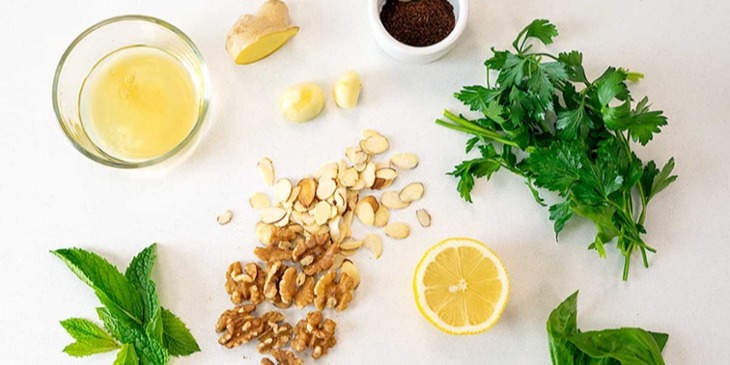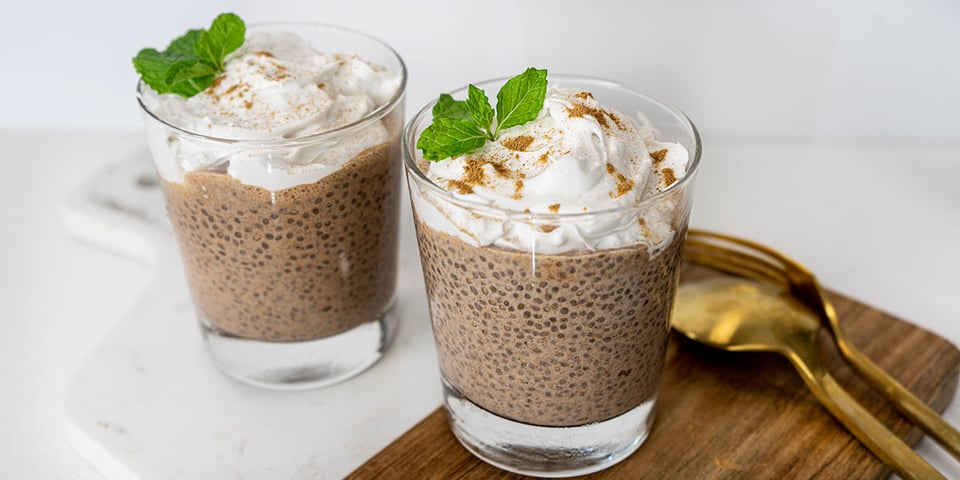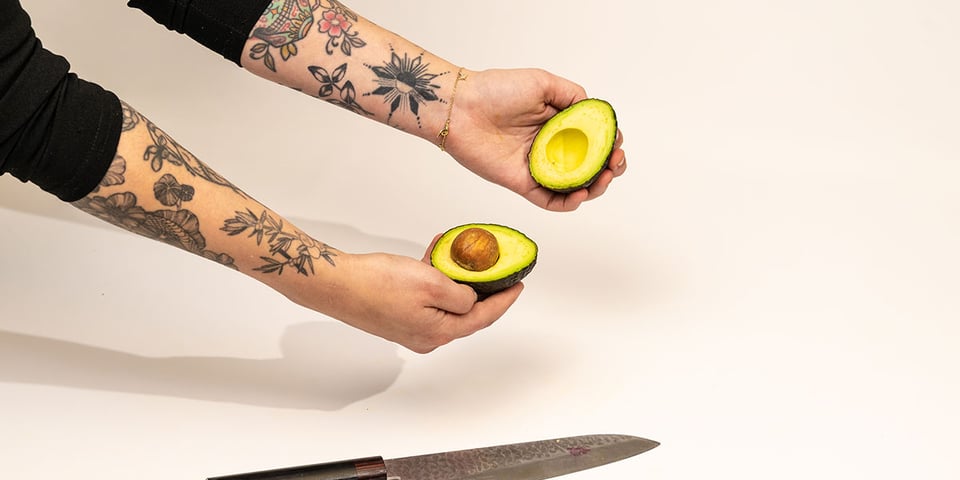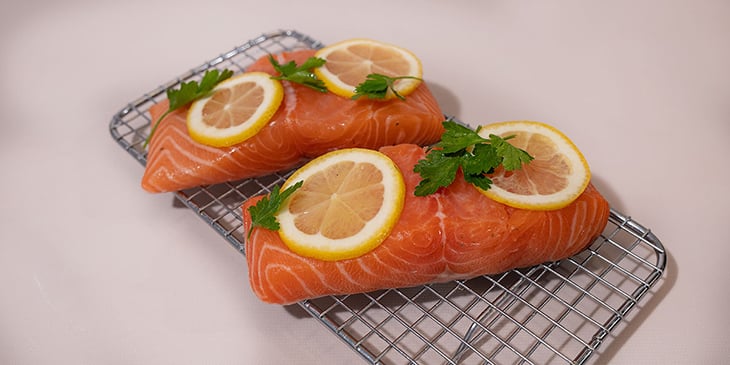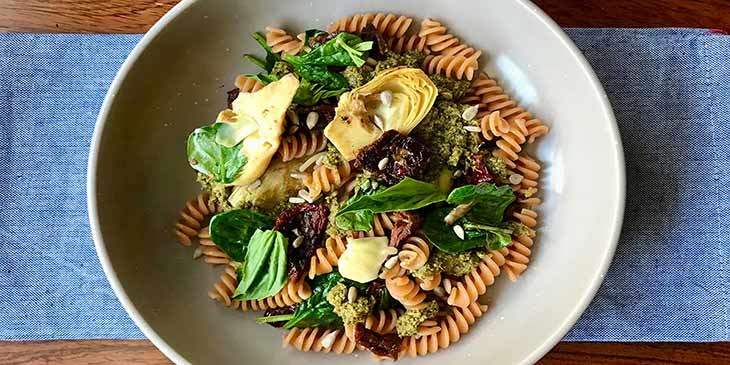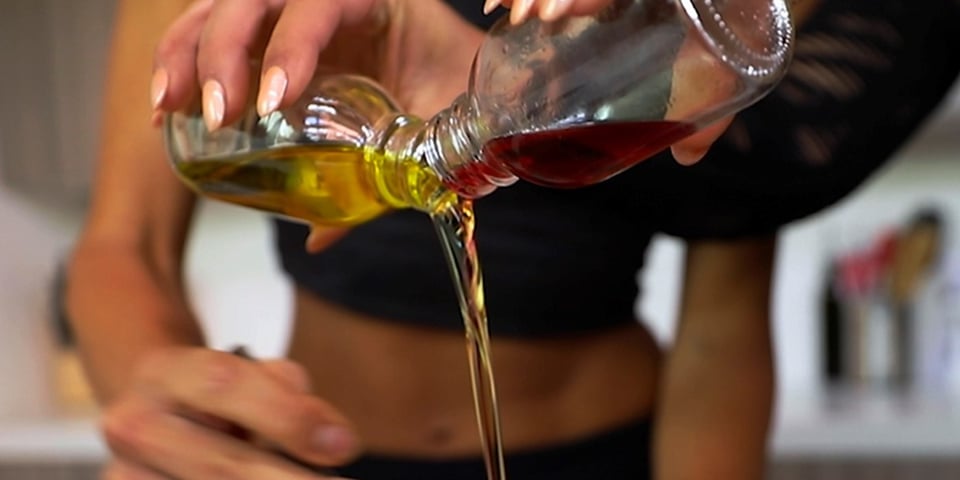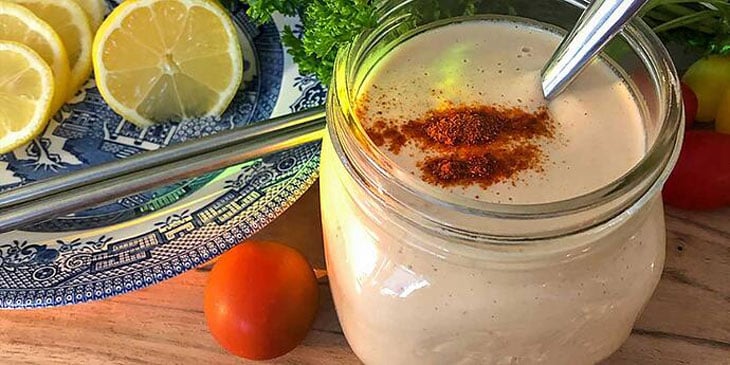Eating fat doesn't make you fat—how we metabolize what we eat is a bit more complicated than this. There are many factors that impact our weight and health, when it comes to our diet the quality and quantity of the food can either work for or against our health goals. This is especially true when it comes to the kinds of fats you consume on a daily basis.
Here's your complete breakdown of what makes fat healthy and the best healthy fat foods you should be including in your meals to support heart, brain, and digestive health.
What Are Healthy Fats?
When it comes to dietary fat, not all sources of fat are created equal, and contrary to what you may have been told in the past, it’s been scientifically proven that the fat we eat doesn’t always create the fat on our bodies.
No single food or type of fat can make or break your health, your overall diet and lifestyle have a much larger impact.
There really isn't any such thing as a "good" or "bad" food or fat, but we do know that some types of fat (unsaturated fats) can provide health benefits and support your fitness and health goals, while other types of fat (trans fats) may impact your cholesterol, weight, and increase your risk of chronic disease like heart disease (1).
We have to eat fat, it’s essential to our health, and plays a role in bodily functions such as hormone production and energy storage, while also keeping us insulated and protecting our internal organs.
Want to make sure you’re getting the right balance of healthy fats in your diet? Determine how much fat you should be eating on a daily basis to best nourish your body and meet your health goals by using our Macro Calculator, which provides the number of carbohydrates, protein, and fat you need to optimize your health and conquer your goals.
Even if you have never tracked your macros, it's a useful tool to help you understand how to portion your food to best support your health goals.
Use this quiz to calculate your personalized macros!
What's the difference between saturated, unsaturated, and trans fats?
There are three main types of dietary fat:
- Saturated Fats
- Unsaturated Fats (Mono-unsaturated & Poly-unsaturated)
- Trans Fats
The main difference between these fats is their chemical structure, which determines their physical and chemical properties – this is why unsaturated fats (poly and mono) are liquid at room temperature, and saturated fats are more solid.
The difference in their chemical structure also impacts how they are absorbed and utilized by the body.
However, anyone with inadequate digestive enzymes or gastrointestinal complications may struggle with processing fats, even the potentially healthy ones.
We craft personalized meal plans with whole foods, healthy fats, and lean proteins to support your health. A healthier lifestyle begins with what's on your plate, and we are serving up the right food for results.
Saturated Fats: Sources and Benefits
Saturated fats come primarily from animal-based proteins and dairy, but can also be found in tropical plant sources like palm oil and coconut.
The potential health benefits or health risks of consuming saturated fat are highly controversial. Some studies suggest that high intakes of saturated fat can raise blood cholesterol levels, while other studies imply saturated fat is neither bad nor good (2,3,4,5,6). This could be due to the fact that plant-based saturated fat like coconut oil may be metabolized differently than animal-based sources.
This debate reflects the fact that there is still much we don't know about nutrition, and probably can't know. It’s impossible to do a true double-blind randomized control trial (the gold standard) with whole foods because there are an exuberant amount of factors that impact our nutritional status.
Unsaturated Fats: Sources and Benefits
Unsaturated fats come primarily from plant-based foods but can also be found in meat, seafood, and dairy options. This includes omega-3 and omega-6 fatty acids found in seafood, nuts, legumes, and other plant-based foods.
These types of dietary fats provide long-lasting energy to fuel your body, they help increase the abortion of fat-soluble nutrients (vitamins A, D, E, and K), and support the production of certain hormones (7,8,9,10).
Additionally, unsaturated fats, primarily from plant-based foods, have well-documented health benefits including heart health, brain health, and anti-inflammatory properties (11,12).
What About Trans Fats?
Trans fats can occur naturally in foods (produced in the gut of some animals and found in foods made from these animals), but a majority of the ones we get in our diet are man-made through food processing techniques - specifically through a process called hydrogenation that involves adding an additional hydrogen to unsaturated fats to make them solid and more shelf-stable at room temperature.
Based on existing research, trans fats are really the only “bad” fat that we have enough supporting research to suggest you limit or remove from your diet. Eating foods high in trans fats can increase blood levels of LDL (bad) cholesterol and reduce levels of HDL (good) cholesterol, increasing your risk of heart disease (13,14).
All foods labels are required to list if they contain trans fats underneath the fat column found on the food label.
Why Dietary Fat Isn't Bad For You
Dietary fat often gets a bad rap because it’s the most calorie-dense macro, at 9 calories per gram, and when eaten in excess it can be easily stored as fat. Hence the original motivation behind ‘low-fat’ diets and fat demonizing messaging that popped up in the 1980s and 1990s, if we stop eating high-calorie fat then we won’t be at risk for weight gain and chronic disease right?
Wrong. When the food industry, healthcare agencies, and government suggested eliminating or using fat sparingly in our diet, they ultimately replaced it with foods high in sugar and processed carbohydrates.
Diets high in refined sugars and carbohydrates have been linked to weight gain, elevated LDL (bad) cholesterol levels, and insulin resistance; whereas diets that are rich in unsaturated dietary fats, such as the Mediterranean diet have been shown to support cardiovascular health and weight management (15).
Carbohydrates and protein can also be stored as body fat and this process requires you to eat more calories than you need—which will always lead to weight gain.
At the end of the day, dietary fat is essential for good health, but because it is the most calorie-dense macro, it can also be easy to overdo it.
Balance is key when it comes to creating a sustainable and healthy diet, and whole-food sources of dietary fat can be a beneficial and tasty addition.
Not only do dietary fats contain more fat-soluble aka vitamins A, D, E, and K, but eating more healthy dietary fats helps our body absorb and utilize these nutrients more efficiently.
How Much Fat Should You be Eating Per Day?
There isn’t a set range for the total amount of fat you should eat each day, this varies from person to person. Also, some people are much more efficient at utilizing fat for energy and do well on a higher fat diet, while others prefer higher carb intake—this is partially determined by your fitness needs as well as your overall lean body mass.
For most, keeping your fat intake around 20% to 30% of your total calories will support good health, unless you are following a keto diet.
When it comes to the kind of fat you are eating, the American Heart Association recommends replacing trans and saturated fats with healthier mono and poly-unsaturated fats (16).
Take this 2-minute quiz to determine your macronutrient goals.
| Eat More | Unsaturated Fats (poly & mono, this includes omega-3 rich foods) |
Shown to lower rates of cardiovascular disease Lowers LDL and triglyceride levels Provides essential fats our body can’t produce itself |
olive oil, avocados, nuts and seeds, tofu (soybeans), corn oil, olive oil, avocados, nuts and seeds, tofu (soybeans), corn oil, sunflower oil, walnuts, canola oil, flaxseed oil, flax seeds |
| Eat Less | Saturated Fats |
May increase the risk of cardiovascular disease May raise LDL cholesterol |
butter, palm, coconut oil, cheese, red meats and processed meats, pastries and convenience foods, vegetable oils |
| Limit / Avoid | Artificial Trans Fat, Hydrogenated Oils |
Shown to increase risk of heart disease Raises LDL cholesterol |
used as a preservative and flavoring; found in foods like doughnuts, baked goods, margarine, and spreads. Small amounts are present naturally in dairy and meat products |
If you’re shopping for low-fat products, be sure to check the ingredient label. Even though some of the fat was removed manufacturers often add sweeteners and other unhealthy preservatives to the boost flavor and texture of the foods. You’re better off consuming naturally low-fat foods like fresh fruits and vegetables!
Healthy Fat Foods To Add To Your Diet
The best types of fat to look for in your diet are omega-3s, specifically DHA and EPA omegas, followed by monounsaturated fats and other unsaturated fats that come from plant-based sources.
Our bodies cannot synthesize omega-3 and omega-6 fatty acids so we have to obtain them through our dietary intake, and aim for a balance between omega-3 and omega-6.
1. Almonds and Walnuts
Almonds and walnuts are popular health foods for good reason. They contain high amounts of heart-healthy fats and pack some fiber and protein—all of which are associated with better appetite control. In addition, almonds are a good source of vitamin E, iron, and magnesium.
Nuts are extremely versatile in the kitchen and make a great grab-and-go snack. You can also incorporate healthy fats like almonds and walnuts by adding toasted nuts to salads, mixing it them into yogurt, garnishing a pasta dish with them, or preparing a nut based sauce like our tangy and refreshing almond and walnut tabbouleh recipe.
Almond and Walnut Tabbouleh Recipe
2. Chia and Hemps Seeds
Nutritionally, chia seeds and hemp are prized for being a good source of omega-3s, specifically alpha-linolenic acid (ALA). But they also contain notable amounts of fiber, magnesium, calcium, and other micronutrients such as selenium, thiamin (B1), zinc, and niacin (B3).
You can use chia seeds and hemp seeds similarly to nuts by including them in salads, yogurt parfaits, or blending them into a protein smoothie. Chia seeds are unique in that when they are soaked in a liquid they take on a gel-like quality, transforming the liquid into a 'pudding' like a treat. Chia seeds pudding is a healthy-fat recipe perfect for meal prep as you can prepare it the night before for a simple grab and go breakfast.
High Protein Chia Seed Pudding Recipe
3. Avocados
Avocados are high in Omega-3 fatty acids, specifically alpha-linolenic fatty acids. Incorporating these healthy monounsaturated fats into your diet can help you feel more satiated, reduce inflammation, encourage microbiome diversity and positively influence your cholesterol levels (17).
They also contain beneficial amounts of fiber, potassium, vitamin C, and vitamin E. In fact, 1 medium avocado provides over 10 grams of fiber (18).
You can easily add a healthy fat like avocado into your meal plan by using fresh avocado as a garnish on tacos, salads, or bowls. If you're looking for a little more pizzaz try preparing an avocado toast for breakfast, blending the avocado into a chocolate protein shake or green breakfast smoothie, or try out our twist on a classic egg salad recipe.
4. Suistainbly Caught Salmon and Other Cold Water Fish
Fatty fish, like salmon, is a known source of the beneficial fat omega-3. There are actually a variety of omega-3 fats found in many different foods, including many plant-based options, but the type found in seafood is unique.
Seafood contains EPA and DHA omega-3 fats. DHA is the same type of fat that lines 80% of our brain, which makes it no surprise that omega-3s from fish are beneficial for your brain health and mental well-being. And both DHA and EPA are thought to be powerful anti-inflammatories and are linked to numerous health benefits including weight loss and chronic disease prevention (19).
A 4-ounce portion of sustainably caught salmon contains more than 1,000mg of healthy omega-3s and 22 grams of protein. Salmon is also a source of vitamin D, vitamin A, and potassium. Salmon isn't the only seafood with notable nutrition, other great sources of DHA omega-3s include fatty fish like herring, mackerel, anchovies, and sardines.
Enjoy a filet of grilled or seared salmon with a salad or pair it with grains and a zesty sauce. Because salmon is a fatty fish, it goes well with bright/acidic sauces and flavors.
5. Algae
Algae is often the source for plant-based omega-3 supplements for people who can't tolerate fish oil. Certain microalgae species are rich in omega-3 fatty acids, making them a suitable alternative, as they can be cultivated in a lab easily.
Spirulina is a blue-green algae that has been used by NASA as a dietary supplement for astronauts! Studies suggest that spirulina contains up to 70% protein along with vitamins and minerals including B12, beta-carotene, and iron (21).
You can incorporate more algae and seaweed into your diet by looking for pre-made seaweed salads at the grocery store, or purchasing a high-quality powder to mix into smoothies, yogurt, or sauces!
6. Olives and Olive Oil
Olives are the nutritious, fatty fruit behind the benefits associated with olive oil consumption. Research suggests that the notable antioxidant properties in olives and olive oil may promote heart health and bone health (22,23,24).
Olives are also super-rich in omega-3 fats and a source of vitamin E, iron, and copper.
Olives can be enjoyed as a quick snack, or you can put them on top of pizza, mix them into a hummus dip, or toss them into a salad or wrap. Olive oil also has a wide variety of culinary uses, and makes a great base for salad dressings and sauces like pesto or chimichurri.
7. Organic, Pasture-raised Eggs 
Even though eggs are traditionally thought of as a protein, more than 60% of their calories come from fat, some of which is omega-3 fats, and only 30% protein.
Eggs sometimes get a bad rap because they contain cholesterol, but contrary to what some may believe, it is unlikely that dietary cholesterol in food is what causes your blood cholesterol to increase (25). And high cholesterol is not typically the result of a single food or food component, but rather the effects of poor lifestyle choices and a nutritionally inadequate diet.
Beyond containing a bit of cholesterol, eggs also provide a source of vitamin D, iron, and choline.
Enjoy eggs however you'd like them for breakfast, lunch, or dinner! Hard-boiled eggs and pre-baked egg bites also make nutritious and high-protein mid-day snacks.
8. Dark Chocolate
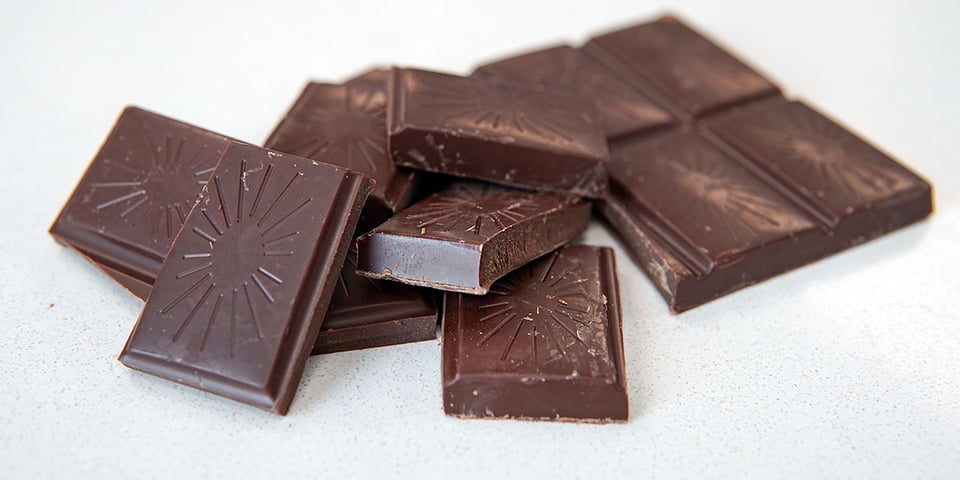
Chocolate is not typically thought of as fat or even a low carb food, but some dark chocolate - and cacao, in particular, is a high-fat food that is rich in beneficial antioxidants. Cacao is linked to improved mood, heart health, brain health, and even weight loss (26,27,28,29).
Cacao is also a source of plant-based saturated fat, fiber, magnesium, zinc, and iron.
To get the full benefits, choose cacao nibs or at least 70% dark chocolate—just be sure to check for too much-added sugar as this will impact carbs. Sprinkle a little dark chocolate over your yogurt or use a high-quality cocoa powder to prepare a delicious dark chocolate pudding or protein shake.
Dark Chocolate Protein Pudding
9. Peanut Butter and Other Nut Butters
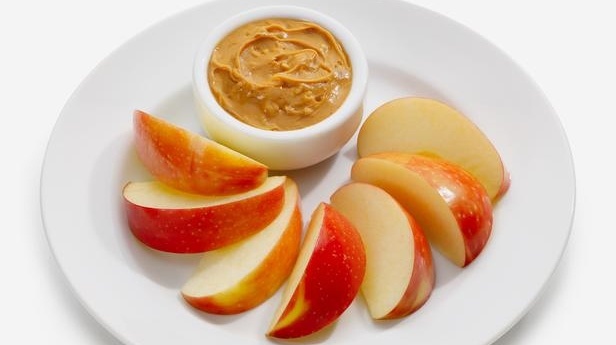
Peanut butter is not just a favorite food from your childhood, it’s also a healthy fat and a good source of protein, magnesium, and vitamin E. Just keep an eye out for brands that include added sugar, as this will increase the carb count a bit.
Almond butter, cashew butter, and sunflower butter are also nutrient-dense and full of healthy fats. All of these nut butters can be enjoyed with fruit as a snack, blended into a smoothie, or used to prepare healthy desserts like a no-bake cookie.
10. Tahini
Tahini is sesame seeds ground into a paste that is often used in hummus or baba ganoush. Just as other seeds are high in healthy fats, tahini is no exception. But it's also a source of protein, fiber, phosphorus, calcium, and iron.
Sesame seeds are also a source of plant-based elements called lignans and phytosterols that may help with cholesterol management (30,31,32).
Tahini makes an amazing base for a salad dressing or even a quick stir-fry sauce.
It's easy to underestimate the amount of fat our body needs to stay healthy, just as it is with all of the other macronutrients as well! Use our customized macro calculator to help you determine the quantity of food to best nourish your body.



